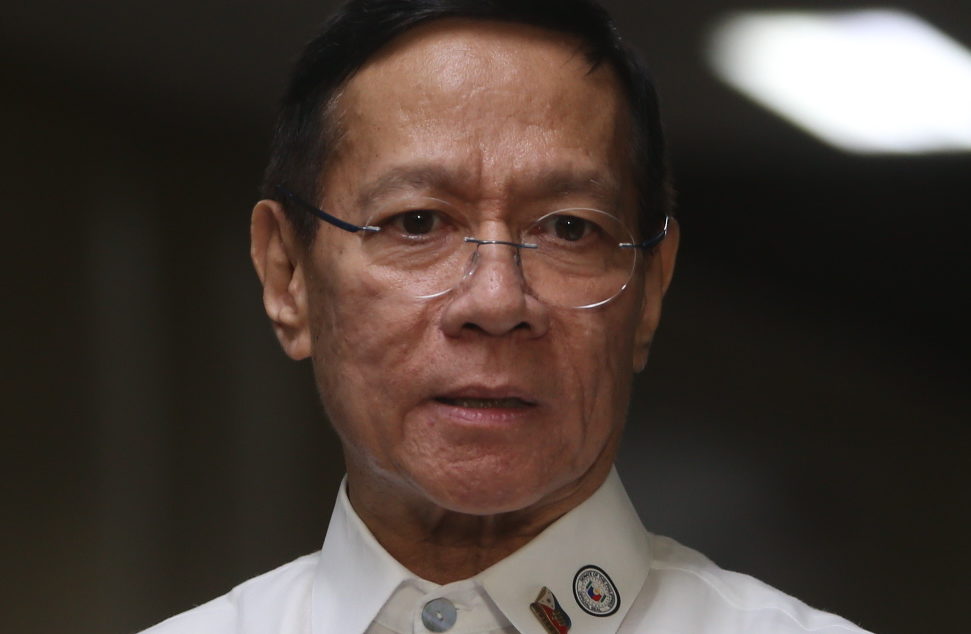Duque: Increased DOH budget still not enough for Covid vaccines
A reenacted spending law for 2021 would not only adversely affect the government’s response to COVID-19, which has already taken 6,152 lives in the country, but also to other diseases, particularly measles, which may affect 2.4 million children next year, Health Secretary Francisco Duque III said on Friday.
“It would greatly impact our COVID-19 response. Even if we have already increased [the budget] it is still not enough. What more if it is reenacted?” Duque told senators during a hearing on the Department of Health’s (DOH) proposed budget for next year.
Duque pointed out that the draft DOH budget set at P127.28 billion is 21-percent higher than this year’s as it includes, among others, a P3.5-billion allocation for the purchase of a potential vaccine for COVID-19.
He said President Duterte wants 20 million Filipinos inoculated once a vaccine is available, but the P3.5-billion budget for this purpose is enough for only 3.8 million and the department would need P12.9 billion to cover the 20 million, which is only a fifth of the country’s population.
Alternative
He said the DOH was considering a “financing arrangement” with the Development Bank of the Philippines and Landbank that would allow the Department of Trade of Industry to procure the vaccine that the DOH will pay for over three years.
“That’s the alternative way of ensuring that we will get sufficient vaccines for 20 million Filipinos,” Duque said.
Article continues after this advertisement“We would really have a hard time. If we get it from other programs like measles, polio, hepatitis, we might see increases [of these diseases],” he added.
Article continues after this advertisementOn Wednesday, DOH warned that there is a “high possibility” that the country would see another measles outbreak next year because the government’s immunization program reached only 67 percent of the target.
By using the number of children born and those inoculated, they were able to estimate that some 2.4 million children under 5 are susceptible to the highly contagious measles.
The country experienced its most recent measles outbreak in 2019 and affected 48,525 people, mostly children, with 642 deaths.
In the case of COVID-19, the DOH reported on Friday an additional 2,996 cases, pushing the national tally to 334,770, with 53,311 active cases.
Metro Manila accounted for a third of the new cases, 1,094, followed by Cavite (282), Batangas (166), Iloilo (152) and Laguna (147).
There is now a total of 275,307 COVID-19 survivors with the recovery of 1,045 more patients but the death toll rose to 6,152.
During the Senate hearing, Sen. Joel Villanueva asked Duque to explain why nearly six out of 10 COVID-19 patients died without getting hospital care, highlighting what he called the DOH’s continued failure to adequately respond to the pandemic.
Villanueva was also disappointed that the DOH’s own records showed that nine out of 10 people who recovered from the new coronavirus disease in the country were not taken to the hospitals.
No access to hospitals
“We find these statistics even more bothering considering that the DOH portal shows that as of Oct. 6, 54 percent of ICU (intensive care unit) beds are still vacant,” he said.
As of Oct. 5, the senator said the DOH records showed that 3,279 of the total of 5,850 individuals who died due to the new coronavirus disease were not treated in hospitals.
Villanueva said 255,010 out of 273,123 COVID-19 patients, or a staggering 93 percent, won their bout against the highly communicable upper respiratory disease without hospitalization.
On the other hand, he said 76 percent of 1,629 critical cases and a whopping 98 percent of 39,204 mild cases also did not get proper medical care in hospitals.
Of the 4,232 patients who did not experience any symptom, he said 91 percent was likewise deprived of receiving medical attention in health-care facilities.
Villanueva pointed out that he had already raised the issue during a Senate hearing attended by Duque last August.
“May we know the explanation to this and how the DOH looked into this problem when we raised this two months ago?” he asked Duque, noting that the figures of those who died without hospital care was at 48 percent then.
“I remember you saying, ‘We have to do something about this,’” he added.
DOAs
The health secretary, whose resignation had been sought by the Senate for supposed negligence and failure of leadership, admitted that many of the dead COVID-19 patients were declared dead-on-arrival (DOA) in hospitals.
“This is really unfortunate because the condition of the patients once they arrive at the emergency room was irreversible. That’s why many of them were declared dead-on-arrival,” Duque said.
“This can also be attributed to the behavior of Filipinos, specially the poor, who wait until their condition worsens before going to the hospitals,” he added.
Duque said local government units should be ready to provide “family care facilities” in communities as part of the implementation of the universal health care law to address the concern of COVID-19 patients who had not received proper medical attention.
For more news about the novel coronavirus click here.
What you need to know about Coronavirus.
For more information on COVID-19, call the DOH Hotline: (02) 86517800 local 1149/1150.
The Inquirer Foundation supports our healthcare frontliners and is still accepting cash donations to be deposited at Banco de Oro (BDO) current account #007960018860 or donate through PayMaya using this link.
